2025年安徽中考英语课件 第二部分 第五节 介词和介词短语
文档属性
| 名称 | 2025年安徽中考英语课件 第二部分 第五节 介词和介词短语 |  | |
| 格式 | ppt | ||
| 文件大小 | 949.5KB | ||
| 资源类型 | 试卷 | ||
| 版本资源 | 通用版 | ||
| 科目 | 英语 | ||
| 更新时间 | 2025-02-27 17:14:42 | ||
图片预览


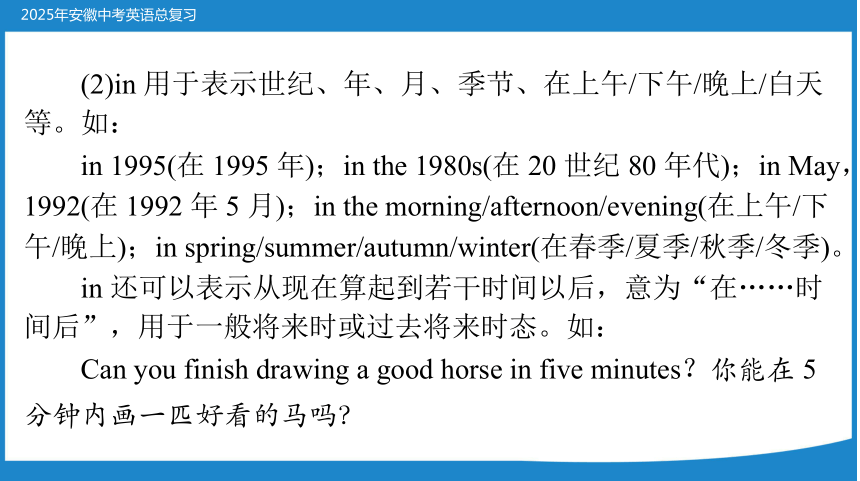
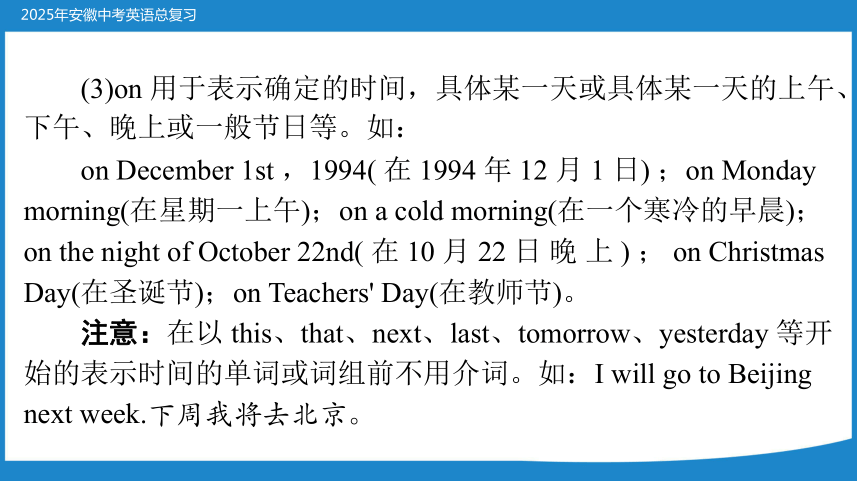
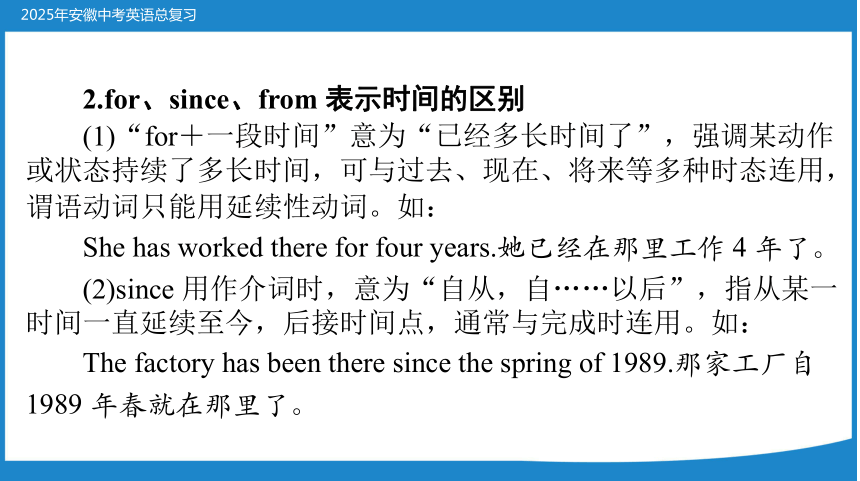

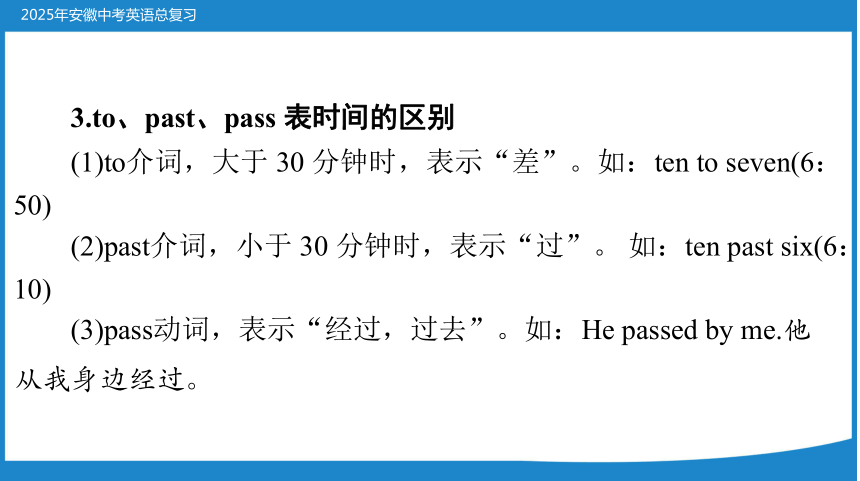


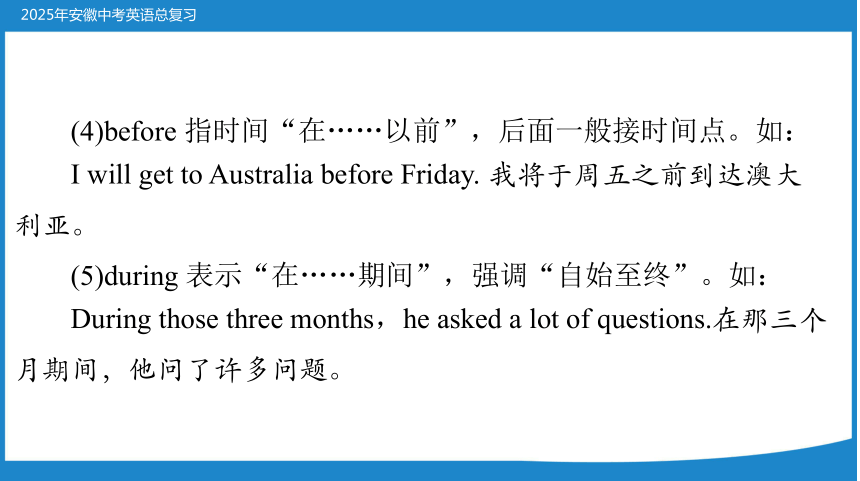
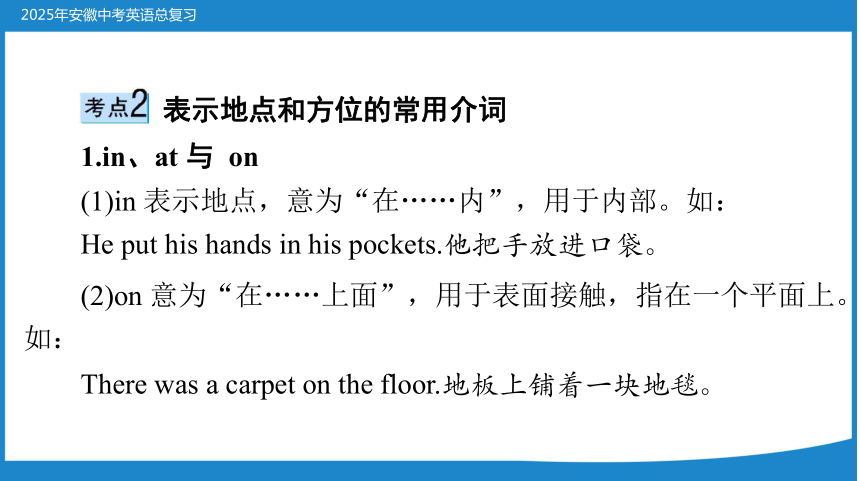
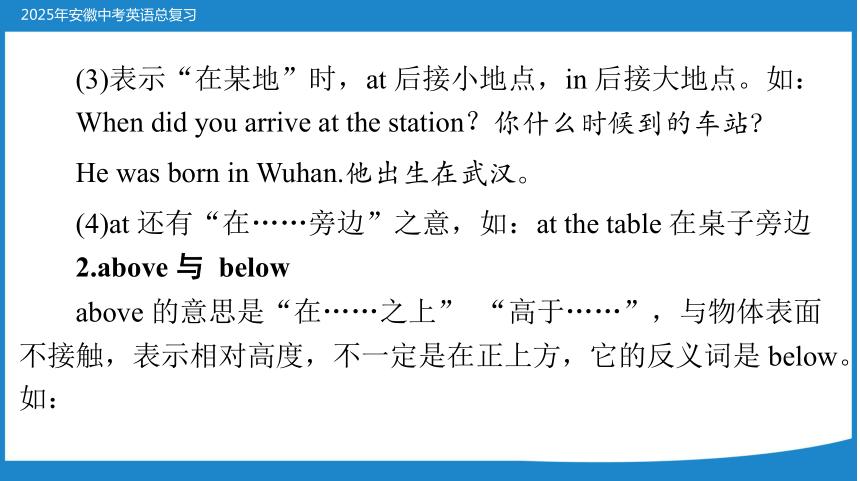
文档简介
(共32张PPT)
第五节
介词和介词短语
第二部分
语法精讲精练
表示时间的介词
1.at、in、on 表示时间的区别
(1)at 表示具体的时间点,常用于表示钟点及某些词组中。如:
at Christmas(在圣诞节);at six o'clock(在 6 点钟);at night(在
晚上);at the end of(在……结束时);at the age of(在……岁时);at
last(最终,最后)。
(2)in 用于表示世纪、年、月、季节、在上午/下午/晚上/白天
等。如:
in 1995(在 1995 年);in the 1980s(在 20 世纪 80 年代);in May,
1992(在 1992 年 5 月);in the morning/afternoon/evening(在上午/下
午/晚上);in spring/summer/autumn/winter(在春季/夏季/秋季/冬季)。
in 还可以表示从现在算起到若干时间以后,意为“在……时
间后”,用于一般将来时或过去将来时态。如:
Can you finish drawing a good horse in five minutes?你能在 5
分钟内画一匹好看的马吗?
(3)on 用于表示确定的时间,具体某一天或具体某一天的上午、
下午、晚上或一般节日等。如:
on December 1st ,1994( 在 1994 年 12 月 1 日) ;on Monday
morning(在星期一上午);on a cold morning(在一个寒冷的早晨);
on the night of October 22nd( 在 10 月 22 日 晚 上 ) ; on Christmas
Day(在圣诞节);on Teachers' Day(在教师节)。
注意:在以 this、that、next、last、tomorrow、yesterday 等开
始的表示时间的单词或词组前不用介词。如:I will go to Beijing
next week.下周我将去北京。
2.for、since、from 表示时间的区别
(1)“for+一段时间”意为“已经多长时间了”,强调某动作
或状态持续了多长时间,可与过去、现在、将来等多种时态连用,
谓语动词只能用延续性动词。如:
She has worked there for four years.她已经在那里工作 4 年了。
(2)since 用作介词时,意为“自从,自……以后”,指从某一
时间一直延续至今,后接时间点,通常与完成时连用。如:
The factory has been there since the spring of 1989.那家工厂自
1989 年春就在那里了。
注意:since 还可以用作连词,用来引导时间状语从句。如:
Great changes have taken place since he left.自从他离开以后,
这里发生了巨大的变化。
(3)from(from…to…) 表 示 开 始 的 时 间 , 意 为“从……”
(“从……到……”),谓语可用过去、现在或将来时态。如:
Students go to school from Monday to Friday. 学 生 们 周 一 至 周
五上学。
3.to、past、pass 表时间的区别
(1)to介词,大于 30 分钟时,表示“差”。如:ten to seven(6:
50)
(2)past介词,小于 30 分钟时,表示“过”。 如:ten past six(6:
10)
(3)pass动词,表示“经过,过去”。如:He passed by me.他
从我身边经过。
4.其余表示时间的介词
(1)after 指时间“在……以后”,后面接时间点或时间段。接
时间段时,多与过去时连用;接时间点时,多与将来时连用。如:
He came back after a few days.几天后他回来了。
I'll call you after 4:30.四点半以后我给你打电话。
(2)till/until 表示“到……为止,直到……之时,直至”,在肯
定句中要用延续性动词。如:
You'd better stay in bed till tomorrow.你最好在床上待到明天。
I shall wait until ten o'clock.我将等到 10 点钟。
在否定句中,not…until…意为“直到……才……”,是连词,
用来引导时间状语从句,谓语动词用短暂性动词。如:I didn't go to
bed until eleven last night.昨天晚上直到 11 点钟我才睡觉。
(3)by 表示“不迟于”(not later than),常与完成时连用。如:
They had seen four films by the end of last night.到昨天晚上为
止他们已经看过四部电影。
(4)before 指时间“在……以前”,后面一般接时间点。如:
I will get to Australia before Friday. 我将于周五之前到达澳大
利亚。
(5)during 表示“在……期间”,强调“自始至终”。如:
During those three months,he asked a lot of questions.在那三个
月期间,他问了许多问题。
表示地点和方位的常用介词
1.in、at 与 on
(1)in 表示地点,意为“在……内”,用于内部。如:
He put his hands in his pockets.他把手放进口袋。
(2)on 意为“在……上面”,用于表面接触,指在一个平面上。
如:
There was a carpet on the floor.地板上铺着一块地毯。
(3)表示“在某地”时,at 后接小地点,in 后接大地点。如:
When did you arrive at the station?你什么时候到的车站?
He was born in Wuhan.他出生在武汉。
(4)at 还有“在……旁边”之意,如:at the table 在桌子旁边
2.above 与 below
above 的意思是“在……之上” “高于……”,与物体表面
不接触,表示相对高度,不一定是在正上方,它的反义词是 below。
如:
The plane flew above the clouds.飞机在云层上面飞行。
The Dead Sea is below sea level.死海的海面低于海平线。
3.over 与 under
over 的意思是“在……之上”, 与物体表面不接触,表示垂
直之上,其反义词是 under。如:
There is a bridge over the river.河上有座桥。
There is a boat under the bridge.桥下有一只船。
4.by、beside 与 near
(1)by 表示“在……旁边”,较 near 更近。如:My house is by
the river.我的家在河边。
(2)beside 表示“近旁”“紧靠”,相当于 next to。如:Come
and sit beside me.来坐在我的身旁。
(3)near 意为“在……附近”,可以表示空间、时间关系等。
如:
He sits near the window.他坐在窗户附近。
5.after 与 behind
(1)after 表示位置关系,意为“在……的后面”。如:
Your name comes after mine in the list.名单上,你的名字列于我
之后。
(2)behind 表示位置,意为“在……后面”。如:
The boy was hiding behind a tree.那个男孩躲在一棵树后。
6.through、across 与 cross
(1)through 介词,纵穿(从空间穿过)。如:
The soldiers went through the forest.那些士兵穿过树林。
(2)across 介词,横穿(横过某个平面)。如:He is walking across
the street.他正在横过马路。
(3)cross 动词,横穿(横过某个平面)。如:He is crossing the street.
他正在横过马路。
7.among 与 between
among 在(三者或三者以上)之间;between 在(两者)之间,常
用词组 between…and…。如:
The man who is standing among the students is Lily's father.站在
学生中间的是莉莉的父亲。
I will be back between five and six.我将在 5 到 6 点之间回来。
8.in、on 与 to
in 表示在范围之内(属于该范围);on 表示与某一地区接壤;to
表示隔海相望。如:
Guangdong is in the south of China.(广东属于中国。)
Guangdong is on the south of Hunan.(广东不属于湖南,但与湖
南是毗邻关系。)
Japan is to the east of China.(日本不属于中国,而是隔海相望。)
9.outside 与 inside
outside 意为“在……的外边”;inside 意为“在……的里边,
在……之内”。如:
A woman is waiting outside the office. 一位妇女正在办公室门
外等候。
Don't let the dog come inside the house.不要让狗进入房子里。
10.in front of 与 in the front of
in front of 表示“在……之前(范围外)”;in the front of 表示
“在……的前部(范围内)”。如:
There are some trees in front of the classroom.教室前面有一些
树。
Our teacher usually sits in the front of the classroom.我们的老师
经常坐在教室的前面。
表示方式、手段或工具的介词
1.by、in 与 on 表交通方式
用 by 时,交通工具前不用任何限定词;用 on 或 in 时,交通
工具前用限定词。如:
Jenny goes to school by bike.詹妮骑自行车去上学。(by bike=
on a bike)
Mr Green goes to work by car.格林先生开车去上班。(by car=in
a car)
2.by、in 与 with 表示手段或工具
(1)with 后跟具体的工具。如:I often do my homework with a
pen.我经常用钢笔做作业。
(2)in 表示使用某种语言或使用某种材料,语言、材料前不加
冠词。如:
Can you say it in English?你能用英语说吗?
(3)by 表示用某种方式或手段,在名词前不加冠词,若后接动
词,需将动词变为动名词形式。如:
This pair of shoes is made by hand.这双鞋是手工做的。
He makes a living by teaching.他靠教书为生。
介词 用法 例句
against 意为“反对”“违背”,
其反义词为 for They are strongly against the
idea.
beyond 意为“(范围、水平、限度、
能力等)超出;多于;
为……所不能及” His bad behaviour is beyond a
joke.他的不良行为超出了开玩
笑的范围。
其他常用介词
他们强烈反对这个意见。
介词 用法 例句
about 意为“关于”,多用于表
示内容和观点比较一般性
的情况 What is your excuse about your
being late yesterday?你昨天迟
到的理由是什么?
like 意为“像……一样”,用
于说明相似关系 He talked to me like my father.
他像父亲那样跟我谈话。(他不
是我父亲)
介词 用法 例句
as 意为“作为,以……的身
份”,后跟表示职业、职务、
身份的名词 We chose him as captain of
our team.我们选他当我们
的队长。
except 意为“除……之外(不包括在
内)”,是从整体中除去一部
分,常和否定代词和概括性代
词连用 We are all here except Li
Ming.除了李明之外,我们
都在这里。
介词 用法 例句
into 意为“往……里(进、蹦、
跳)去”,常和动词连用 Many frogs jumped into the
lake.许多青蛙跳进了湖里。
with 表示伴随,意为“和……
一起” She lives with her parents.她和
父母住在一起。
without 意为“没有”,用作状语 He left without saying a word.
他什么也没有说就离开了。
介词 用法 例句
for (1)表示目的,意
为“为了” Let's go for a walk.让我们去散步吧。
(2)表示原因、理
由 Sanya is famous for “Tianya Haijiao”.三亚
因“天涯海角”而出名。
(3)表示用途、对
象 I think drinking milk is good for our health.
我认为喝牛奶对我们的健康有好处。
(4)表示价格 He sells his books for fifty yuan.他以 50 元
的价格卖掉了他的书。
介词 用法 例句
along 意为“沿着,顺着” We've planted more than 1 , 000 trees
along the banks of the river. 我 们 沿 着
河岸种了 1000 多棵树。
off 意为“离开,脱离” Keep off the grass.勿踏草地。
介词短语
1.介词与动词的常见搭配
listen to 听
get on/off 上车/下车
laugh at 嘲笑
look for 寻找
get to 到达
wait for 等待
hear from 收到……的来信
think of 想起,认为
spend…on 花费……
do with 对付,处置
worry about 担心
look after 照顾,照料
agree with 同意
depend on 依靠
turn on/off 打开/关掉
regard…as 把……当作
knock at 敲
count on 指望,依赖
talk about 谈论
turn up/down(音量)调大/调小
pay for 付款
ask for 请求
call on/upon 拜访,看望
apply to 向……申请;运用到
2.介词与形容词的常见搭配
be fond of 喜欢
be ready for 为……做好准备
be kind to 对……亲切
be sure about 确信
be busy with 忙于
be late for 迟到
be afraid of 害怕
be good at 擅长于
be full of 装满
3.介词与名词的常见搭配
by bike/bus/train 骑自行车/乘公共汽车/乘火车
with/without one's help 在有/没有某人的帮助下
on one's way to 在某人去……的路上
on time 准时
to one's surprise 使某人惊奇的是
on foot 步行
at the end of 在……尽头,末尾
at the foot of 在……的脚下
第五节
介词和介词短语
第二部分
语法精讲精练
表示时间的介词
1.at、in、on 表示时间的区别
(1)at 表示具体的时间点,常用于表示钟点及某些词组中。如:
at Christmas(在圣诞节);at six o'clock(在 6 点钟);at night(在
晚上);at the end of(在……结束时);at the age of(在……岁时);at
last(最终,最后)。
(2)in 用于表示世纪、年、月、季节、在上午/下午/晚上/白天
等。如:
in 1995(在 1995 年);in the 1980s(在 20 世纪 80 年代);in May,
1992(在 1992 年 5 月);in the morning/afternoon/evening(在上午/下
午/晚上);in spring/summer/autumn/winter(在春季/夏季/秋季/冬季)。
in 还可以表示从现在算起到若干时间以后,意为“在……时
间后”,用于一般将来时或过去将来时态。如:
Can you finish drawing a good horse in five minutes?你能在 5
分钟内画一匹好看的马吗?
(3)on 用于表示确定的时间,具体某一天或具体某一天的上午、
下午、晚上或一般节日等。如:
on December 1st ,1994( 在 1994 年 12 月 1 日) ;on Monday
morning(在星期一上午);on a cold morning(在一个寒冷的早晨);
on the night of October 22nd( 在 10 月 22 日 晚 上 ) ; on Christmas
Day(在圣诞节);on Teachers' Day(在教师节)。
注意:在以 this、that、next、last、tomorrow、yesterday 等开
始的表示时间的单词或词组前不用介词。如:I will go to Beijing
next week.下周我将去北京。
2.for、since、from 表示时间的区别
(1)“for+一段时间”意为“已经多长时间了”,强调某动作
或状态持续了多长时间,可与过去、现在、将来等多种时态连用,
谓语动词只能用延续性动词。如:
She has worked there for four years.她已经在那里工作 4 年了。
(2)since 用作介词时,意为“自从,自……以后”,指从某一
时间一直延续至今,后接时间点,通常与完成时连用。如:
The factory has been there since the spring of 1989.那家工厂自
1989 年春就在那里了。
注意:since 还可以用作连词,用来引导时间状语从句。如:
Great changes have taken place since he left.自从他离开以后,
这里发生了巨大的变化。
(3)from(from…to…) 表 示 开 始 的 时 间 , 意 为“从……”
(“从……到……”),谓语可用过去、现在或将来时态。如:
Students go to school from Monday to Friday. 学 生 们 周 一 至 周
五上学。
3.to、past、pass 表时间的区别
(1)to介词,大于 30 分钟时,表示“差”。如:ten to seven(6:
50)
(2)past介词,小于 30 分钟时,表示“过”。 如:ten past six(6:
10)
(3)pass动词,表示“经过,过去”。如:He passed by me.他
从我身边经过。
4.其余表示时间的介词
(1)after 指时间“在……以后”,后面接时间点或时间段。接
时间段时,多与过去时连用;接时间点时,多与将来时连用。如:
He came back after a few days.几天后他回来了。
I'll call you after 4:30.四点半以后我给你打电话。
(2)till/until 表示“到……为止,直到……之时,直至”,在肯
定句中要用延续性动词。如:
You'd better stay in bed till tomorrow.你最好在床上待到明天。
I shall wait until ten o'clock.我将等到 10 点钟。
在否定句中,not…until…意为“直到……才……”,是连词,
用来引导时间状语从句,谓语动词用短暂性动词。如:I didn't go to
bed until eleven last night.昨天晚上直到 11 点钟我才睡觉。
(3)by 表示“不迟于”(not later than),常与完成时连用。如:
They had seen four films by the end of last night.到昨天晚上为
止他们已经看过四部电影。
(4)before 指时间“在……以前”,后面一般接时间点。如:
I will get to Australia before Friday. 我将于周五之前到达澳大
利亚。
(5)during 表示“在……期间”,强调“自始至终”。如:
During those three months,he asked a lot of questions.在那三个
月期间,他问了许多问题。
表示地点和方位的常用介词
1.in、at 与 on
(1)in 表示地点,意为“在……内”,用于内部。如:
He put his hands in his pockets.他把手放进口袋。
(2)on 意为“在……上面”,用于表面接触,指在一个平面上。
如:
There was a carpet on the floor.地板上铺着一块地毯。
(3)表示“在某地”时,at 后接小地点,in 后接大地点。如:
When did you arrive at the station?你什么时候到的车站?
He was born in Wuhan.他出生在武汉。
(4)at 还有“在……旁边”之意,如:at the table 在桌子旁边
2.above 与 below
above 的意思是“在……之上” “高于……”,与物体表面
不接触,表示相对高度,不一定是在正上方,它的反义词是 below。
如:
The plane flew above the clouds.飞机在云层上面飞行。
The Dead Sea is below sea level.死海的海面低于海平线。
3.over 与 under
over 的意思是“在……之上”, 与物体表面不接触,表示垂
直之上,其反义词是 under。如:
There is a bridge over the river.河上有座桥。
There is a boat under the bridge.桥下有一只船。
4.by、beside 与 near
(1)by 表示“在……旁边”,较 near 更近。如:My house is by
the river.我的家在河边。
(2)beside 表示“近旁”“紧靠”,相当于 next to。如:Come
and sit beside me.来坐在我的身旁。
(3)near 意为“在……附近”,可以表示空间、时间关系等。
如:
He sits near the window.他坐在窗户附近。
5.after 与 behind
(1)after 表示位置关系,意为“在……的后面”。如:
Your name comes after mine in the list.名单上,你的名字列于我
之后。
(2)behind 表示位置,意为“在……后面”。如:
The boy was hiding behind a tree.那个男孩躲在一棵树后。
6.through、across 与 cross
(1)through 介词,纵穿(从空间穿过)。如:
The soldiers went through the forest.那些士兵穿过树林。
(2)across 介词,横穿(横过某个平面)。如:He is walking across
the street.他正在横过马路。
(3)cross 动词,横穿(横过某个平面)。如:He is crossing the street.
他正在横过马路。
7.among 与 between
among 在(三者或三者以上)之间;between 在(两者)之间,常
用词组 between…and…。如:
The man who is standing among the students is Lily's father.站在
学生中间的是莉莉的父亲。
I will be back between five and six.我将在 5 到 6 点之间回来。
8.in、on 与 to
in 表示在范围之内(属于该范围);on 表示与某一地区接壤;to
表示隔海相望。如:
Guangdong is in the south of China.(广东属于中国。)
Guangdong is on the south of Hunan.(广东不属于湖南,但与湖
南是毗邻关系。)
Japan is to the east of China.(日本不属于中国,而是隔海相望。)
9.outside 与 inside
outside 意为“在……的外边”;inside 意为“在……的里边,
在……之内”。如:
A woman is waiting outside the office. 一位妇女正在办公室门
外等候。
Don't let the dog come inside the house.不要让狗进入房子里。
10.in front of 与 in the front of
in front of 表示“在……之前(范围外)”;in the front of 表示
“在……的前部(范围内)”。如:
There are some trees in front of the classroom.教室前面有一些
树。
Our teacher usually sits in the front of the classroom.我们的老师
经常坐在教室的前面。
表示方式、手段或工具的介词
1.by、in 与 on 表交通方式
用 by 时,交通工具前不用任何限定词;用 on 或 in 时,交通
工具前用限定词。如:
Jenny goes to school by bike.詹妮骑自行车去上学。(by bike=
on a bike)
Mr Green goes to work by car.格林先生开车去上班。(by car=in
a car)
2.by、in 与 with 表示手段或工具
(1)with 后跟具体的工具。如:I often do my homework with a
pen.我经常用钢笔做作业。
(2)in 表示使用某种语言或使用某种材料,语言、材料前不加
冠词。如:
Can you say it in English?你能用英语说吗?
(3)by 表示用某种方式或手段,在名词前不加冠词,若后接动
词,需将动词变为动名词形式。如:
This pair of shoes is made by hand.这双鞋是手工做的。
He makes a living by teaching.他靠教书为生。
介词 用法 例句
against 意为“反对”“违背”,
其反义词为 for They are strongly against the
idea.
beyond 意为“(范围、水平、限度、
能力等)超出;多于;
为……所不能及” His bad behaviour is beyond a
joke.他的不良行为超出了开玩
笑的范围。
其他常用介词
他们强烈反对这个意见。
介词 用法 例句
about 意为“关于”,多用于表
示内容和观点比较一般性
的情况 What is your excuse about your
being late yesterday?你昨天迟
到的理由是什么?
like 意为“像……一样”,用
于说明相似关系 He talked to me like my father.
他像父亲那样跟我谈话。(他不
是我父亲)
介词 用法 例句
as 意为“作为,以……的身
份”,后跟表示职业、职务、
身份的名词 We chose him as captain of
our team.我们选他当我们
的队长。
except 意为“除……之外(不包括在
内)”,是从整体中除去一部
分,常和否定代词和概括性代
词连用 We are all here except Li
Ming.除了李明之外,我们
都在这里。
介词 用法 例句
into 意为“往……里(进、蹦、
跳)去”,常和动词连用 Many frogs jumped into the
lake.许多青蛙跳进了湖里。
with 表示伴随,意为“和……
一起” She lives with her parents.她和
父母住在一起。
without 意为“没有”,用作状语 He left without saying a word.
他什么也没有说就离开了。
介词 用法 例句
for (1)表示目的,意
为“为了” Let's go for a walk.让我们去散步吧。
(2)表示原因、理
由 Sanya is famous for “Tianya Haijiao”.三亚
因“天涯海角”而出名。
(3)表示用途、对
象 I think drinking milk is good for our health.
我认为喝牛奶对我们的健康有好处。
(4)表示价格 He sells his books for fifty yuan.他以 50 元
的价格卖掉了他的书。
介词 用法 例句
along 意为“沿着,顺着” We've planted more than 1 , 000 trees
along the banks of the river. 我 们 沿 着
河岸种了 1000 多棵树。
off 意为“离开,脱离” Keep off the grass.勿踏草地。
介词短语
1.介词与动词的常见搭配
listen to 听
get on/off 上车/下车
laugh at 嘲笑
look for 寻找
get to 到达
wait for 等待
hear from 收到……的来信
think of 想起,认为
spend…on 花费……
do with 对付,处置
worry about 担心
look after 照顾,照料
agree with 同意
depend on 依靠
turn on/off 打开/关掉
regard…as 把……当作
knock at 敲
count on 指望,依赖
talk about 谈论
turn up/down(音量)调大/调小
pay for 付款
ask for 请求
call on/upon 拜访,看望
apply to 向……申请;运用到
2.介词与形容词的常见搭配
be fond of 喜欢
be ready for 为……做好准备
be kind to 对……亲切
be sure about 确信
be busy with 忙于
be late for 迟到
be afraid of 害怕
be good at 擅长于
be full of 装满
3.介词与名词的常见搭配
by bike/bus/train 骑自行车/乘公共汽车/乘火车
with/without one's help 在有/没有某人的帮助下
on one's way to 在某人去……的路上
on time 准时
to one's surprise 使某人惊奇的是
on foot 步行
at the end of 在……尽头,末尾
at the foot of 在……的脚下
